Common NounA common noun is a general word for a people, location, or item in a category or class. This type of noun can be concrete noun (sensory), abstract noun(containing generic ideas or traits), or collective noun (implying to groups or collection). 
In contrast to proper nouns, common noun cannot be capitalized until they start a statement or phrase or occur in a title. A noun is a word that can be employed to describe an individual, animal, place, object, or idea. All nouns could be further subdivided into proper and common nouns. This noun implies to the word that are used to imply to generic objects instead of specific things. Enter your living area. What do you notice? A chandelier, a couch, a sofa, a television, windows, artwork, a cushion, and a lamp are common nouns. Common nouns are all around you, and we utilize them almost every minute, even if you aren't aware. Everywhere you walk, you'll come across at least one common noun. A road, a wardrobe, a restroom, a classroom, a marketplace, a petrol station, and a living space are all examples of common nouns. 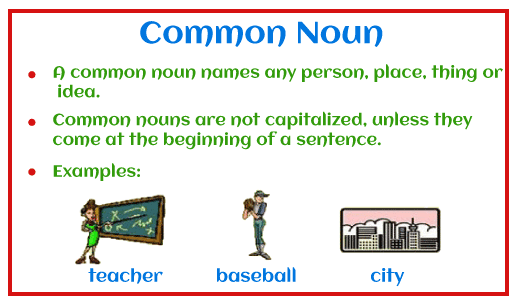
What is the distinction between proper nouns and common nouns?When comparing the two basic categories of nouns - proper and common - we can state that a common noun is a broadway of describing things, whereas a proper noun is a precise way to classify things. So, for instance, the term puppy is a common noun; however, if your puppy's name was Franco, the word Franco is a proper noun: 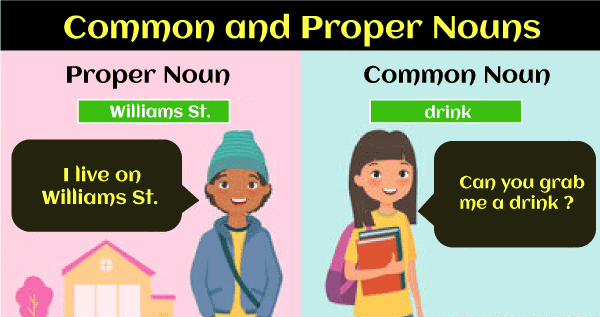
Puppy = common noun Puppy's name (in this context, Fido) = proper noun Here are some more instances of the distinction between common and proper nouns:
As you can see from the instances, common nouns are not usually capitalized. As you can see from the examples, common nouns do not show significance unless they start a phrase, but proper nouns are. You'll also observe that both sorts of nouns can include more than one word. Conclusively, It appears that differentiating between common nouns and proper nouns is simple; why would we have to understand the distinction? The correct way to allocate capital letters is the solution to that issue. Usage and Application of Common Nouns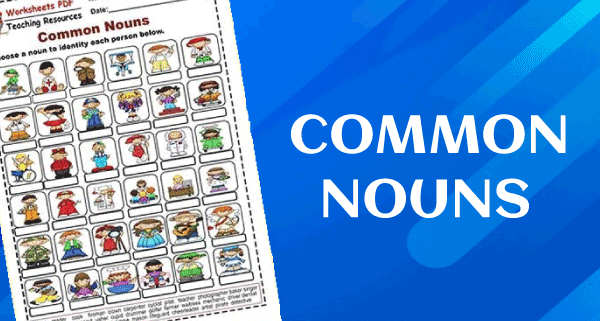
Common nouns are used to describe a collection of items or an idea. Consider the term star, as in the stars that can we can see in the sky. The term "star" is a common word that refers to the group of objects that we see in the sky at night, namely the luminous objects that are scattered throughout the universe and twinkle aloft. On the other hand, the Sun is a proper noun that refers to the single star at the core of our planetary system. As a result, anything that is an object can be classified as common noun: Advocate, physician, educator, therapist, lawmaker, and football coach are examples of occupations. People: In general, people are called with common nouns, while their official names or given titles are proper nouns in some situations. We utilize common nouns to describe people, such as educator, shopkeeper, law enforcement officer, priest, truck driver, lover, fiancée, granny, cousin, and cafe. For instance, when discussing your father, a father is a common noun. My father is a well-known actor. Sara's grandmother was the state's biggest baker. When talking to your aunt or referring to her as an aunt as her name or title, however, aunt, in that case, is used as a proper noun. "Aunt, can you cook your pancakes for the group?" I invited Mother Thomson to supper with us. Objects include a van, a magazine, a vessel, a potato chip, a slipper, a castle, a desk, and a knife. Common nouns, on the other hand, can be more abstract concepts, not things but thoughts, emotions, and experience, as in: Abstract concepts are culture, compassion, freedom, time, hate, harmony, conflict, empathy, fury, and laughter. 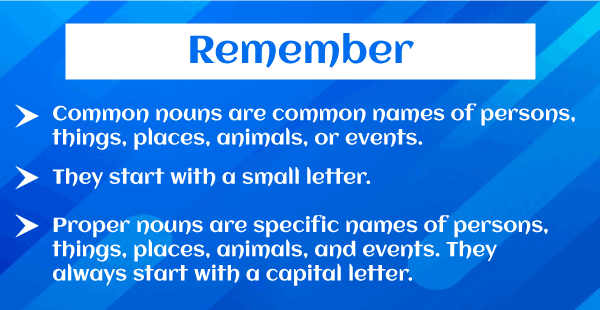
How do you identify a common noun?As said at the beginning of this post, one quick way to identify common nouns is to see if we can use any restricting modifiers with them, such as a, an, my, every, or some, and make sure it's all lowercase. As an example: Peter slammed his book into the door. Hamlet was thrown against the door by Peter. In the first example, his may be substituted for a and the sentence still read properly, indicating that "book" is a common noun. In the following instance, Hamlet has two features that is- It is capitalized and cannot be substituted with any other modifier (As there is only one Hamlet), indicating that it is a proper noun. Given what we've covered so far, identifying a common noun should be fairly simple. However, there are several examples in which it can be difficult. Consider the following statements: Queen Elizabeth II greeted President Biden. Donald Trump frequently visited Queens, numerous cities, and nations during his tenancy as the president of the USA. Queen Elizabeth II, President Trump, and President Biden are proper nouns in statements. They are titles that apply to a particular individual. Queens, palaces, cities and nations, and the president are all common nouns in the sentence. Nations, cities relate to nations and cities in general, while the president alludes to the job title rather than the specific individual. As previously stated, common nouns include job roles and generalized titles such as lawyer, actor, comic, lorry driver, soldier, policeman, and secretary. On the other hand, if these acquire specific titles, they can be termed as the proper noun as mentioned in the above examples and sentences. Normally, this implies that when the phrases are positioned right in front of that specific or person's name, they are capitalized: Mr. Trump chose Mr. William as Attorney General. However, consider how we use the same phrase with common nouns: While in service, each US president has to choose an attorney general. The fact that the common noun is not capitalized allows you to identify it. However, keep in mind that common nouns can also be recognized since they pertain to non-specific entities or groupings. The takeaway is that common nouns are generic names that are not normally capitalized unless they are included in a title like General Secretary or begin a statement. 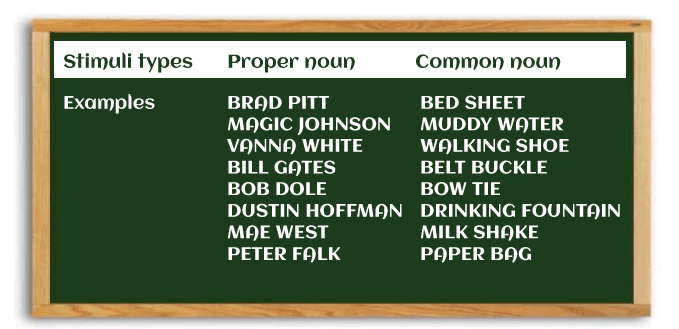
Common Errors with Common NounsWhen utilizing popular nouns, it is usual practice to capitalize them, especially when referring to titles and professions. Because words like the president, chancellor, or queen sound significant, they are frequently capitalized improperly. A simple method to avoid this error is to examine your term carefully. Is it particular? Is it referring to a specific person, item, place, etc.? If not, keep it in lowercase. Unnecessary capitalization of common nouns is a prevalent spelling error. Some terms, such as president, seem to call for a capital letter because we naturally want to emphasize their significance. However, if it does not name someone or something particular, even this exalted title is a common noun (in this case, a certain or particular president). The USA has had four Presidents this era.- Incorrect Usage The USA has had four presidents this era.- Correct Usage George Washington was the initiate President of the USA.- Incorrect Usage George Washington was the initial president of the USA.- Correct Usage The examples of common nouns provided below will assist you in recognizing common nouns. Common noun instances are italicized in the phrases that follow. It's worth noting that the instances of proper nouns use different names for the same type of individual, animal, location, object, or concept. Common Noun: She broke my most liked plate. Proper Noun: I am astonished to see she broke my Snoopy Plate. Common Noun: I really wish to purchase new pair of jeans this weekend. Proper Noun: I am planning to purchase a pair of Levis. Common Noun: I am not able to recollect the name of that artist. Proper Noun: I am fantasized about the artwork by Van Gogh. Common Noun: My cousins are waiting for us at the marketplace. Proper Noun: My cousins are there at the Jim's Burgers. Common Noun: We are planning to relocate to the city. Proper Noun: We think Denmark was perfect out of all the cities and places we have lived. Common Noun: my friend and I are planning to watch a live match this weekend. Proper Noun: We are trying to get a great sight seat at Markey Field.
Next TopicNoun Examples
|
 For Videos Join Our Youtube Channel: Join Now
For Videos Join Our Youtube Channel: Join Now
Feedback
- Send your Feedback to [email protected]
Help Others, Please Share










